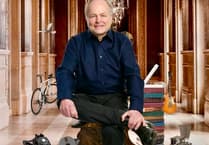AN emergency signal sent by a motorboat that sparked a major search and rescue mission on the Severn turned out not to be on on the treacherous river, but parked on the owners' drive in Swindon.
While the story was treated with some light hearted glee by the national press, the reality is that the rescue craft were launched a total of three times in search of the apparently stricken vessel in large-scale operations that needlessly cost the rescue organisation thousands of pounds.
The drama began when a weak automatic distress signal was received at around ten pm at the transponder on the Severn bridge, which relayed the information to the SARA headquarters at Beachley. This identified the boat as a 17ft motor cruiser called Rat Racer - and by the catagory of the signal, the boat was in grave and imminent danger. SARA immediately launched rescue boats from both Beachley and Sharpness, but nothing was found despite the teams covering a huge area of the river.
The next day a simple false alarm sent the crews racing back onto the river, before a second emergency signal from Rat Racer was received, sparking another massive search, this time covering three miles upstream and downstream of the old Severn bridge. The rescues commanded a staff of up to 26 to crew the SARA boats which were deployed during the alarm.
It was then that HM Coastguard discovered in their records that the boat was registered to an address in Hamble, Hampshire – but that proved a dead-end as the craft had been sold. The enquiries eventually uncovered the fact that the mayday signals were being broadcast from the boat's new home, parked on a drive in Swindon, some 50 miles from the sea.
The false alarms were found to have been caused by children playing on the boat, who had activated the automatic emergency mayday signals which were picked up by SARA.
SARA have advised all boat-owners to effectively disable their automatic emergency transmitters – ideally by disconnecting the battery – when the boat is land-based.
It was not clear at the time of going to press whether the owner of the boat would face repaying the cost of the false alarms. SARA is a volunteer-based charity, and the costs incurred in the rescues will be a further unnecessary burden on their finances.




